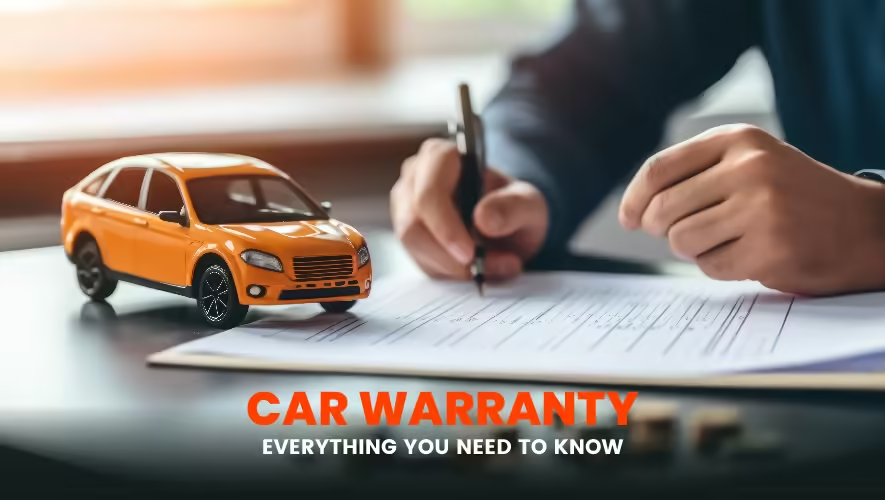Cars are not cheap nowadays, and so it makes sense for buyers to try to secure their new cars as much as possible. That is where car warranty come in. A car warranty can be described as an agreement in which the car manufacturer or your selling agent agrees to fix or replace certain parts of your car at no extra charge after a given time or distance covered.
However, car warranties are not very clear; some of their terms and conditions differ depending on the manufacturer as well as the different warranty types available in the market. The goal of this guide is to dispel the myths associated with car warranties and let you know what is actually included.
What is a car warranty?
A car warranty is insurance from the manufacturer or seller that assures you that the car that has been sold to you will work well. If it doesn’t, and if the problem falls under the warranty, then it is the manufacturer or seller who has to deal with it. Warranties normally only include defects in materials or workmanship; however, the degree of protection offered may be different as well as the amount of time the warranty is good for.

For example, broadly, the car warranties come with a basic warranty, which is the bumper-to-bumper warranty and the power train warranty. However, as you are going to find out in this guide, not all warranties are the same. It is therefore important to know what warranties exist and what is included in a warranty before buying a car.
Types of Car Warranties
There are basically various kinds of car warranties, and they differ in the fact that they offer protection to different components of the car or when distinct events that are considered as warranty provisions occur. Below are the most common types:
- Bumper-to-Bumper Warranty: Even as the name suggests, this pertains to a car warranty that covers virtually every aspect of a car, from the front bumper to the rear. It comprises parts such as an electrical system, air conditioning, etc. Nevertheless, it often does not cover ordinary maintenance such as new brake pads, tires, and wipers, amongst others. This car warranty is usually given for a given time (in most cases three years or 36,000 miles, whichever is earliest) and is considered the best warranty type.
- Powertrain Warranty: This warranty remains on the most important part of the car, the engine, transmission, and drivetrain. Powertrain warranties are usually longer than bumper-to-bumper warranties, sometimes ranging from five to ten years. But they are not as extensive of a warranty, and so one must check what is and is not included in the warranty.
- Corrosion/Rust Warranty: There are companies that are willing to give customers a corrosion or rust car warranty that provides protection in instances where metal parts of a particular product have rusted. As a result, this warranty is valuable in areas that have high humidity or where the roads are salted when it is wintering. These warranties may range from several years up to a decade, on some occasions.
- Roadside Assistance: Most new automobiles come equipped with a roadside assistance plan that assists if your car has an issue. Examples of services offered are towing, boost, flat tire change, and fueling. This coverage is generally available with the same period as that of the bumper-to-bumper warranty.
- Extended Warranty: Once the initial manufacturer’s warranty expires, car owners can opt for an extended warranty. Extended warranties, also known as service contracts, cover repairs after the original car warranty has expired. These warranties can be purchased through the dealership, manufacturer, or third-party providers, and they vary widely in terms of what’s covered and for how long.
What’s Really Covered?
An option that many car owners look into is buying an actual car warranty for their car, and when you do this, you need to know more about what can and cannot be claimed. While each warranty is different, here’s a breakdown of some common components that are typically included in standard warranties:
- Mechanical Components: These include the engine, transmission, sentimental, and drivetrain, all of which are important components for the car. Most of these parts are generally contained by power train warranties. But that is maybe just scraping the surface, and there can be other exemptions as well. For example, any harm that is caused by a lack of proper care or alteration of the car’s features will cause Falcons to incur costs that will lead to warranty Beetles being denied.
- Electrical Systems: Inside today’s automobiles, there is a myriad of electrical equipment ranging from windows to enhanced navigation. These parts are most often included under the bumper-to-bumper car warranty. Nevertheless, scenarios involving light bulbs, fuses, and the like are often left out of the deal because they are deemed as wear and tear items.
- Suspension: There are warranties that hold for the suspension system, whereby a car has things like shock absorbers or struts, among other things, with regards to how a car rides. However, this coverage may not include such easily worn-out parts as bushings or ball joints.
- Air Conditioning and Heating: Although the car’s heating, ventilation, and air conditioning can be part of bumper-to-bumper warranties, However, items such as filters and refrigerants may not be inclusive of the costs as a result.
- Corrosion Protection: As for the areas characterised by high levels of rust, corrosion coverage often may become attractive for car sales. This kind of car warranty provides for the cost of rusted metal part replacement; however, it may not cover damages by debris or an accident.
- Exclusions: You also need to know the things that are not covered in your warranty at times. A car warranty usually does not include ordinary maintenance, the consequences of an accident, misuse, or cosmetic deterioration.
What to Do When Your Car is No Longer Covered
If your car is no longer under warranty, it’s still important to understand your vehicle’s repair needs and potential costs. Here are a few things to keep in mind:
- Check the Mileage and Date of Purchase: Even if you’re unsure whether your car is still under warranty, you can check the mileage and purchase date to determine if it’s expired. If your car has exceeded the mileage limit, it’s no longer covered. If it hasn’t, you’ll still need to check the date of purchase.
- Use the VIN to Verify Coverage: If you don’t know the original purchase date, you can use the vehicle identification number (VIN) to look it up. Most dealerships selling your car’s brand can access this information and confirm whether your car is still under warranty.
- Transferred Warranties for Used Cars: If you’re not the first owner of your car, it’s essential to verify whether the warranty was transferred to you when you purchased the vehicle. In most cases, warranties are transferable, but some manufacturers have different rules for used vehicles, and certain benefits may change
All About Extended Warranties
When you buy a new car, you don’t have to decide whether to purchase a warranty – the manufacturer’s warranty comes standard. However, when your initial car warranty expires, you may have the option to buy an extended warranty for continued coverage. Extended warranties can be valuable, but they’re also more complex and can vary widely in terms of what’s covered.Here are some key things to know about extended warranties:
- Powertrain vs. Bumper-to-Bumper Coverage: Extended warranties can be limited to powertrain coverage, or they can offer bumper-to-bumper protection. However, unlike the original manufacturer’s warranty, most extended warranties come with a deductible, which you must pay before the warranty covers the repair costs.
- Exclusion Warranties: One of the best types of extended warranties is an exclusion warranty, which covers everything except specific items that are listed as exclusions. This offers broader coverage and a lower chance of claim denial.
- Cost of Extended Warranties: The cost of an extended warranty varies greatly, depending on factors such as the make and model of your car and the level of coverage. Extended warranties can range from a few hundred to a few thousand dollars per year. It’s important to weigh the cost of the warranty against the potential repair costs for your vehicle.
- Scams and Fraudulent Calls: Be wary of unsolicited phone calls offering extended warranties, as these are often scams. According to the Federal Communications Commission, car warranty scams are one of the most common types of phone scams. Always purchase extended warranties from reputable sources, such as your car’s dealership or a trusted company.
Do You Need an Extended Car Warranty?
Deciding whether to purchase an extended car warranty depends on several factors, including the type of car you own, how long you plan to keep it, and your financial situation. Here are some things to consider:
- Reliability of Your Car: Modern cars, particularly those from Japanese automakers, are built to last. If you own a reliable vehicle with low repair costs, it may not make financial sense to buy an extended warranty.
- Luxury and Sports Cars: On the other hand, if you own a luxury or sports car, repair costs can be significantly higher. In these cases, an extended warranty may save you money in the long run.
- Emergency Fund vs. Warranty: Instead of paying for an extended warranty, some car owners choose to set aside an emergency repair fund. This allows them to cover any repair costs as they arise, without paying for a warranty they may never use.
Tips for Choosing the Right Car Warranty
When it comes to choosing a car warranty, here are a few tips to help you make the right decision:
- Buy from Reputable Sources: Always buy warranties from trusted sources, such as the dealership where you purchased your car, or a reputable third-party company. Avoid buying warranties from unsolicited phone calls or unknown online sources.
- Read the Fine Print: Before purchasing a warranty, make sure you read the terms and conditions carefully. Look for exclusions, deductibles, and any limitations on the coverage.
- Compare Different Plans: Don’t settle for the first warranty you come across. Compare different plans from multiple providers to ensure you’re getting the best deal.
- Consider Your Car’s Age and Mileage: Extended warranties are often more valuable for older cars with higher mileage. If your car is relatively new and in good condition, you may not need an extended warranty just yet.
Conclusion
Car warranties offer peace of mind by covering repair costs for various components of your vehicle, allowing you to focus on driving without worrying about unexpected expenses. However, not all warranties are the same, and it’s essential to understand the differences between bumper-to-bumper coverage, powertrain warranties, and extended warranties. By knowing what’s covered and what’s excluded, you can make more informed decisions when purchasing a car or choosing whether to extend your coverage.
Remember to carefully read the terms of any warranty, consider your car’s reliability and repair history, and evaluate whether an extended warranty fits your needs and financial situation. In some cases, creating an emergency fund may be a more practical alternative. Ultimately, understanding the ins and outs of car warranties will help you protect your investment and ensure that you’re prepared for any repair costs that might arise down the road.
Get expert advice, in-depth car reviews, and all the tips you need to choose the perfect vehicle. Whether you’re a beginner or an enthusiast, My Car Wisdom has got you covered. Visit us now for the latest car insights and reviews.
Frequently Asked Question’s
1. Is the Warranty Transferable if I Sell My Car?
Yes, most car warranties are transferable to the new owner when you sell your vehicle, which can increase the resale value. However, it depends on the manufacturer and type of warranty. Some manufacturers require you to pay a transfer fee or notify them about the ownership change within a specific timeframe. It’s important to check with the manufacturer or dealership for the exact procedure, as not all warranties are automatically transferable.
2. Does the Warranty Cover Both Parts and Labor?
Yes, most standard car warranties cover both the cost of parts and labor for necessary repairs. This applies to items covered under bumper-to-bumper and powertrain warranties. However, there are exceptions. For example, wear-and-tear items like brake pads and tyres are generally excluded. Some extended warranties may include a deductible, meaning you’ll need to pay part of the labor or parts cost before the warranty kicks in. Be sure to understand your warranty terms to know what is included.
3. How Long Does a Typical New Car Warranty Last?
A typical new car warranty lasts between 3 to 5 years or 60,000 to 100,000 kilometres, whichever comes first. Some manufacturers offer longer warranties for certain components, such as powertrain warranties that can last up to 7 or 10 years or 100,000 to 150,000 kilometres. It’s important to check both the time and mileage limits of your specific warranty to avoid unexpected costs once the coverage expires.
4. Are All Parts of the Vehicle Covered Under the Warranty?
No, not all parts are covered under a typical car warranty. While bumper-to-bumper warranties cover most components, wear-and-tear items like tyres, brake pads, wiper blades, and filters are excluded. Routine maintenance services, such as oil changes and tyre rotations, are also not covered. Cosmetic issues like paint chips or minor dents are usually excluded as well. Always check the warranty terms for a list of covered and excluded items.
5. Do I Have to Service My Car at the Dealership to Keep the Warranty Active?
No, you don’t have to service your car at the dealership to maintain the warranty. However, any service you get must meet the manufacturer’s guidelines, and you should use authorised or certified mechanics. It’s crucial to keep records of all maintenance and repairs, as you may need to prove that your car has been properly serviced. If you fail to do so, it could void your warranty, even if you didn’t go to the dealership for service.
Raja Yadav, the content writer at My Car Wisdom, brings a unique voice and style to our blog. With a knack for storytelling and a keen eye for detail, Raja ensures that every piece of content is informative, engaging, and easy to understand. His focus is on delivering high-quality articles that cater to both novice car owners and seasoned automotive enthusiasts.




